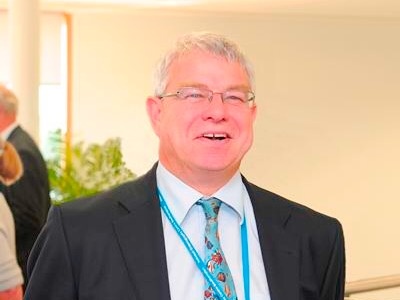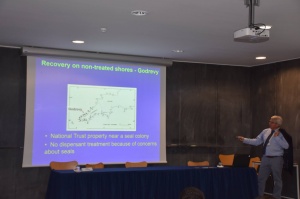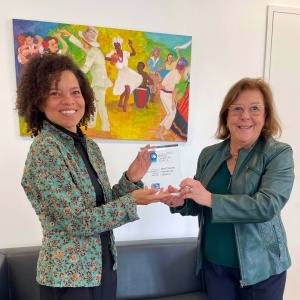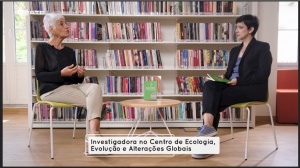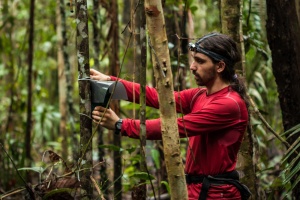15/09/2017. Interview by Marta Daniela Santos.
On the left: Stephen Hawkins at the cE3c Annual Meeting (June 5-6, 2017).
Rocky shores have been compared to the ecologists’ fruit fly, for being a good and easy to work with experimental model. And several scientific questions can be answered by studying these particular environments: from understanding competition between species, to evaluating the impacts of pollution and climate change, just to mention a few.
Stephen J. Hawkins, Emeritus Professor of the University of Southampton and Lankester Research Fellow at the Marine Biological Association (United Kingdom) is an ecologist who has worked for more than 35 years on experimental marine ecology. In this interview, Stephen J. Hawkins talks about his long-term studies of rocky shores - in particular, about the Torrey Canyon oil spill and the subsequent monitoring of the recovery - but also about climate change, and his strong research connection with Portugal for the last three decades.
Stephen J. Hawkins was plenary speaker of the cE3c Annual Meeting 2017, which took place at São Miguel Island (Azores, Portugal) on June 5-6, 2017.
You have a quote on your webpage that says “I like to be on shore counting things!”. Why have you chosen rocky shores as your particular research area?
Well, I’m an ecologist who happens to work on marine systems. And I use rocky shores because they’re a highly tractable experimental system: people have likened rocky shores as the ecologists’ fruit fly, for being such a good model system. The reason for that is that in a few meters you get a very sharp environmental gradient between fully marine and fully terrestrial conditions. The same as going from the tropics to the arctic, or from the bottom to the top of a mountain, for example.
This provides a very good means of understanding interactions between organisms and the environment in terms of what sets distribution patterns. Also, rocky shore species tend to be slow-moving but quite fast-growing with short life spans, which allows you to do experiments and you can get a climax community in two to three years, in many instances.
My particular interest in rocky shores comes from back when I started my PhD, in which I looked at interactions between species - removing species and seeing what the effects would be on the rest of the system. In particular, focusing on grazing interactions between molluscs, particularly limpets and algae, and how the grazing of the limpets was important in structuring rocky shores along the environmental gradients.
You mentioned limpets and algae; what other species can we find in these environments?
You also get a lot of barnacles, for example - the bigger barnacles are very popular in Portugal, known as percebes. And also mussels, which stick on the rocks and have fine hairs on their gills, which act as a net which trap particles, and they feed that way. And buzios, which are important predators; and of course there are lots of crabs, which are top predators and influence the whole food chain.
And what kind of ecological problems can we better understand by studying the interactions between these species and their fluctuations over time?
For example, some of the first work on competition between species was done on rocky shores, looking at competition between barnacle species, by a famous American ecologist called Joseph Connell. The first work on predation on rocky shores was done by another famous American ecologist: he removed starfish and showed the effect of removing a predator on the mussel assemblage, particularly on diversity.
These are just some examples of early experimental work, and there has been an explosion of this kind of experimental ecology throughout the world. This first wave of people who did experimental ecology in the 1950s and 1960s have had their scientific offspring: their students, and their students’ students, several generations down now - who have gone on to do experimental work in several places. I am part of the second wave [laughs]. My scientific granddad was Norman Jones he was in his sixties when I was nineteen and he taught me marine Ecology at Liverpool. He supervised Richard Hartnoll, who supervised my PhD. And now, I have supervised about eighty PhD students, and a lot of them have done experimental ecology.
Long-term studies are very important in marine ecology, and at the cE3c Annual Meeting you presented an example - your work on the Torrey Canyon oil spill and subsequent monitoring of the recovery. Can you explain in what consisted this study?
Well, the Torrey Canyon oil spill took place in 1967, but to explain this study I have to go back a decade before that. In the early 1950s my postdoc mentor, Professor Alan Southward, noticed that the proportions of northern and southern species of barnacles had been changing in the North East Atlantic, and that the warm water species were doing better. So, in the 1950s he started a network of sustained observations of rocky shores in the southwest of England, around the Plymouth Laboratory of the Marine Biological Association (MBA), where I also did my PostDoc with him.
In 18 March 1967 the Torrey Canyon, transporting 120 thousand tons of crude oil from Kuwait to a oil refinery at Milford Haven, hit some rocks and nearly all the oil was spilled. It was one of the first oil spills, a major one, and it was actually adjacent to the sites that Alan Southward had been studying for ten years. It took place near one of the major holiday regions in the Southwest of England, so there was a real worry about the tourist season. And the Prime Minister at the time, Harold Wilson, also took a personal interest because he had a holiday cottage on the Isles of Scilly, about 7 miles from where the wreck was.
There was a big overreaction: the arm forces were sent in, the navy coordinated the response, and a huge amount of first generation dispersants were used - at the time, they were euphemistically called detergents, but they were basically organic solvents, many of them derived from oil based products. There was no preparation: nowadays every area of the coast has a plan of how to deal with an oil spill, but in those days it was being made up as it went along. The problem was that the dispersants were much more toxic than the oil itself. And most of the damage to the marine life was not necessarily done by the crude oil - which was toxic, but not that toxic.
Molluscs were particularly sensitive, and the detergents killed vast numbers of grazing limpets. In the abscence of limpets, within six months the seashore went green with ephemeral green algae, and then within approximately one year the shore was covered by large numbers of big brown algae, which lasted for three or four years. Then the limpets recovered.
So this was the topic of my presentation at the [cE3c] Annual Meeting. Also, I would like to say I was extremely impressed by the quality of science at the meeting - and the gradation between basic science, using model organisms like Drosophila, through to strategic and applied science, on subjects like climate change and land use. I felt that the centre has a really good chance to address many of the problems which face Portugal and Europe.
Thank you for your words! And what do your long-term results tell you about climate change - is it possible to make a connection?
Globally speaking, we are now observing temperatures much warmer than anything that has been recorded in the previous 130 years of systematic sea observations, and using proxies we can go back further. For example, using long lived clams - which live maybe 400 years - and doing oxygen isotope analysis it is possible to reconstruct temperatures back to the medieval period. So, we are now seeing much warmer temperatures, and these are certainly caused by global warming due to human activities - greenhouse gases going into the atmosphere and causing the world to get warmer.
We are also seeing shifts of species: northern species are retreating, while the distributions of southern species are extending northwards, in response to global warming in the North Atlantic.
So, if we want to understand things like climate change and pollution and the interactions between its impacts, which are occurring at a global scale with local and regional impacts, we need broad scale and long-term data.
You have a strong research connection with Portugal, and in particular with our research centre. Would you like to highlight some projects in which you have worked?
Well, in 1985, while working at the Plymouth laboratory of the Marine Biological Association, I met Helen Martins, who was working at the Department of Oceanography and Fisheries of the University of Azores, in Faial. And she invited me to do some work at the Azores in 1986, on limpets (lapas). I worked with Ricardo Santos, a marine biologist of whom I was PhD supervisor and who is now a member of the European Parliament.
In 1988 I was invited by people from the Department of Biology in São Miguel to go to a workshop and we did some work describing rocky shores there - that was when I met a very young Ana Neto (cE3c/Azorean Biodiversity Group), who was then a student. And we got to supervise a few joint PhD students since.
Since then I have met lots of Portuguese scientists, and over the years I have supervised I think fifteen or sixteen Portuguese PhD students out of the eighty PhD students I have supervised.
It is a long time - let’s hope this collaboration continues!
It will - but it will be made more difficult by Brexit. I think it will be very bad for British science that we will no longer be able to work with our European colleagues. Particularly if you are interested in the environment - because the environment operates on a continental wide, or ocean basin wide, scale.
Over the last thirty years it has been great to be able to do the same kind of experiments in Sweden, Ireland, France, Spain, Portugal… To get a feeling about how general ecological processes are, but also to have the broad scale view to be able to distinguish global change from more local impacts and also regional scale impacts. So I hope that, whatever happens, British scientists will still be able to collaborate with colleagues all over Europe.
Because science does not know frontiers.
No, science does not know frontiers. And ecological processes do not respect political boundaries. And one of the big problems with the environment is that most of the problems that face us are operating at greater scales than the legislation that can control them.
And how do you perceive the recent decision of United States to leave the Paris Agreement?
I was at COP-21 in Paris in 2015, and I was very pleased that America had signed up to the Paris Agreement. So I am very worried now that one of the biggest countries in the world decides not to sign up.
One of the big problems with human perception is that people are very aware of weather as they tend to have very short-term perspectives. And you need to look at climate change on at least a ten-year-basis and over thousands of miles of spatial extent, for it to mean anything. These are not the kind of timescales that fit well with politicians, nor with investment cycles. Everything tends to be on a three- to five-years cycle - but climate acts on a longer basis.
I was initially quite skeptical about global warming in the late 1980s, early 1990s - my view then was that it was due to natural cycles. But I think that the evidence from the Physics is so convincing, that we are having a major effect on climate which is superimposed on top of these natural cycles. There is good evidence that the levels of carbon dioxide are going up, as well as the levels of methane - which is a very powerful greenhouse gas, particularly associated with some agricultural practices.
So, the evidence is pretty strong. But at the moment there is a move-away from evidence-based science, and I think it is really important for scientists that we continue to advocate the use of scientific evidence to underpin policy. And I think that in Europe we are fortunate, because the European Union relies heavily on scientific advice and takes it seriously. I fear what will happen when evidence is not being taken into account, particularly in very large countries such as the United States. Because if you don’t face up to the problem, there is no way you can mitigate it nor adapt to it.
And the problem is not going to go away.
No, it’s not. The good thing is that most of the legislation that matters in the United States is done at the state or municipality level. So, the mayors and governors can make a real difference on the ground.
Also, we live in a world with finite oil, so economic pressures will inevitably lead to the search for alternative energy sources. Clean technologies are becoming cheaper, so I think that in addition to government action there will be market forces which will keep renewables moving forward.

